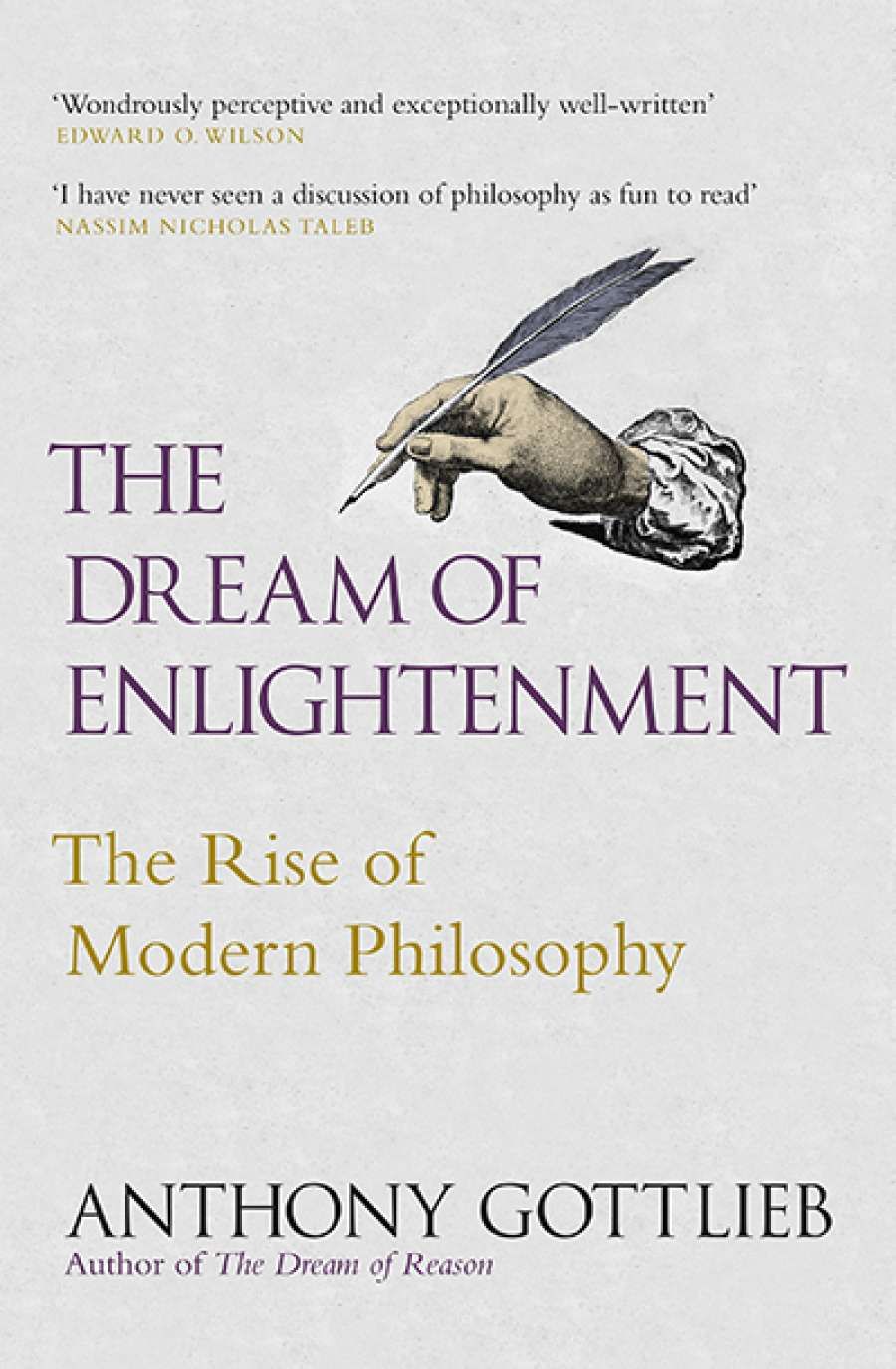
- Free Article: No
- Contents Category: Philosophy
- Custom Article Title: Tim Smartt reviews 'The Dream of Enlightenment: The rise of modern philosophy' by Anthony Gottlieb
- Book 1 Title: The Dream of Enlightenment
- Book 1 Subtitle: The rise of modern philosophy
- Book 1 Biblio: Allen Lane $49.99 hb, 320 pp, 9780713995442
Anthony Gottlieb’s The Dream of Enlightenment, an introduction to the philosophy of this period, is the second instalment in a three-volume history of Western philosophy aimed at a general readership. The first volume, The Dream of Reason (2000), covered philosophy from ancient Greece to the Renaissance, and was both popular and critically well received. Gottlieb’s trilogy, when finished, will take up the commendable and difficult task of popularising the history of philosophy. The seminal book in this genre is Bertrand Russell’s History of Western Philosophy (1945); Roger Scruton and Anthony Kenny have penned other notable surveys. The Dream of Enlightenment tells the story of philosophy from the 1620s to the 1770s. Descartes, Hobbes, Spinoza, Locke, Leibniz, and Hume are covered in some depth; there are briefer discussions of Bacon, Bayle, Voltaire, Rousseau, and Diderot.
The main strength of Gottlieb’s book is the storytelling. Gottlieb, who edited The Economist for more than a decade, puts his journalistic instincts to good use in constructing his narrative. The book is crammed with fascinating biographical details about the philosophers. We learn, for example, that the young Thomas Hobbes worked as an assistant to Francis Bacon; that Descartes’s Meditations (1641) was published with responses from Hobbes and other prominent intellectuals; that Locke wrote a constitution for the colony of Carolina (which stretched from present-day Virginia to Florida); that this document won him an admirer, years later, in Thomas Jefferson; that Voltaire scribbled angry marginalia in his copies of Rousseau; that Hume and Rousseau struck up a friendship, only to fall out publicly; and that (my favourite) Diderot once said of Leibniz, ‘When one compares one’s own talents with those of Leibniz it is tempting to throw away one’s books and go off and die in some quiet corner.’ Gottlieb also provides an illuminating account of three social developments that absorbed writers during this era: the scientific revolution; the religious fragmentation and violence that followed the Reformation; and changing attitudes towards political authority.
 Anthony Gottlieb (photograph by Syrie Moskwitz)The book, though enjoyable and highly readable, is not entirely successful. Gottlieb falters in two important respects. First, his accounts of individual philosophers are surprisingly uneven. The chapters on Locke and Hume are engaging introductions to their thought, and convey their motivations and major breakthroughs. Gottlieb’s discussion of Hume’s account of inductive reasoning is particularly lucid. However, the discussion of other philosophers is problematic. For example, Gottlieb presents Descartes as something of a joke. We are told he ‘was a proud man’ who ‘often lost his temper’ and was ‘exceptionally abusive’. Apparently, his writings were partly ‘an exercise in propaganda’; they ‘ramble back and forth’; and he ‘tried to work out too much in his head’. It is unclear why Gottlieb adopts such a derisive tone here, and it does not help us to comprehend Descartes’s ideas. Indeed, the details of Descartes’ swork, which many take to be amongst the most important in Western philosophy, are not given their due in The Dream of Enlightenment.
Anthony Gottlieb (photograph by Syrie Moskwitz)The book, though enjoyable and highly readable, is not entirely successful. Gottlieb falters in two important respects. First, his accounts of individual philosophers are surprisingly uneven. The chapters on Locke and Hume are engaging introductions to their thought, and convey their motivations and major breakthroughs. Gottlieb’s discussion of Hume’s account of inductive reasoning is particularly lucid. However, the discussion of other philosophers is problematic. For example, Gottlieb presents Descartes as something of a joke. We are told he ‘was a proud man’ who ‘often lost his temper’ and was ‘exceptionally abusive’. Apparently, his writings were partly ‘an exercise in propaganda’; they ‘ramble back and forth’; and he ‘tried to work out too much in his head’. It is unclear why Gottlieb adopts such a derisive tone here, and it does not help us to comprehend Descartes’s ideas. Indeed, the details of Descartes’ swork, which many take to be amongst the most important in Western philosophy, are not given their due in The Dream of Enlightenment.
Second, Gottlieb makes it clear that Enlightenment thinkers defined themselves vis-à-vis Aristotelian scholasticism, the dominant philosophy of medieval Europe, but he does not devote sufficient time to explaining exactly what this is. One could, of course, turn to Gottlieb’s first volume. However, the reader who has no desire to read another book in order to understand this one will be left with a weak understanding of what was so new about Enlightenment philosophy.
Gottlieb’s book provides a neat way of getting one’s head around one of the most important periods in the history of philosophy. But the literature is already populated with accessible, lively, measured introductions by some of the world’s best philosophers. Richer accounts of the figures covered in Gottlieb’s survey can be found, for instance, in: Simon Blackburn’s Think (1999); Steven Nadler’s The Philosopher, the Priest, and the Painter: A portrait of Descartes (2013) and A Book Forged in Hell: Spinoza’s scandalous treatise and the birth of the secular age (2013); Philip Pettit’s Made with Words: Hobbes on language, mind and politics (2008); Maria Rosa Antognazza’s Leibniz: A very short introduction (2016); and Daniel Garber’s essay ‘Religio Philosophi’ (2005).


Comments powered by CComment